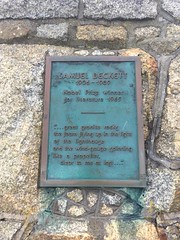Samuel Beckett
Commemorated on 4 plaques
Samuel Beckett 1906-1989 1969 Nobel Prize for Literature at school 1920-1923
Portora Royal School, Enniskillen, United Kingdom where they attended school
Samuel Beckett (1906 - 1989) Writer and Nobel Laureate was born and mainly lived in Cooldrinagh, Kerrymount Avenue, Foxrock until 1927. This area insporied the settings for many of his works including Molloy, Watt, All That Fall and Company.
Brighton Road, Foxrock Viullage,, Dublin, Ireland where they was
Samuel Beckett 1906-1989 dramatist and author lived here in 1934
48 Paultons Square, Chelsea, London, United Kingdom where they lived (1934)
Samuel Beckett (1906 - 1989) Nobel Prize Winner for Literature 1969. "....great granite rocks the foam flying up in the light of the lighthouse and the wind gauge spinning like a propeller clear to me at last....".
East Pier, Dún Laoghaire, Ireland where they walked past (1906-1989)





